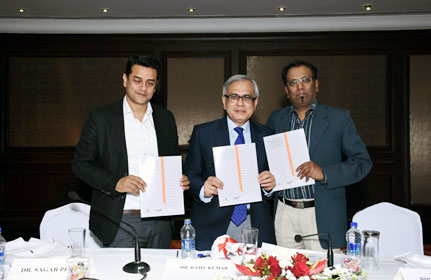The biggest concerns for food security in South Asia are the barriers to food trade in the region, resulting from an absence of timely reforms. These include sanitary and phyto-sanitary barriers (SPS), Technical Barriers to Trade (TBT) and problematic administrative measures, as identified in the research report ‘Non-Tariff Measures (NTMs) to Food Trade in India: A Case Study of Selected Ports’ released by the Centre for Policy Research, along with CUTS International and the Asia Foundation.

Bipul Chaterjee, Executive Director, CUTS International said, “Given the multitude of agencies involved in administering food imports at these trading posts, better coordination and capacity building is required for personnel dealing with specific matters. Often, delays in clearances occur due to misinterpretation of executive orders or lack of communication between key personnel at these ports”.
“Economic losses from business process delays can get pretty large” points Sagar Prasai, Head of the Asia Foundation in India, “while estimates vary, we could be looking at a US $ 10 billion gain in GDP, if basic business processes around clearances, certification and labelling begin to function in a predictable manner”
Key recommendations:
Deeper integration and harmonization of SPS, TBT, and administrative measures can greatly help improve the food security framework in South Asia.
Addressing some of the infrastructural issues at trading posts will help reduce time costs and help ease trade.
More inter-agency coordination, capacity building measures, transparency in testing procedures and trained personnel at the border trading posts will help result in improved food trade in the subcontinent.
“Reforms to address NTMs will help India move up the Ease of Doing Business Ranking”, said Dr. Rajiv Kumar, Senior Fellow at the Centre for Policy Research. “With Prime Minister Narendra Modi focusing on improving relations with India’s South Asian neighbours, it is opportune for India to lower barriers for food trade within South Asia. Moreover, this will also help in establishing a robust food security framework in the region”
Research methodology:
Research on identifying and assessing such Non-Tariff Measures (NTMs) was conducted at six trading ports in India: at land ports in Attari, Agartala, Panitanki and Petrapole, and at the sea ports of Chennai and Mumbai – the Jawaharlal Nehru Port Trust.
The study used perception and field surveys to talk to various stakeholders such as exporters, importers, freight forwarders, clearing agents, customs officials, port authorities, shipping lines, container freight stations chamber houses and officials working in agencies such as the Food Safety Standards Authority of India (FSSAI), Plant Quarantine (PQ) and Animal Quarantine (AQ) among others.
After thorough analyses of food import processes at these ports, recommendations were drawn to help reduce NTMs.
For more information, please contact
Hemant Shivakumar
Coordinator and Research Associate
Project on Food Trade, Centre for Policy Research
New Delhi
Email: hemant92@gmail.com
Mobile: +91-8800124682
